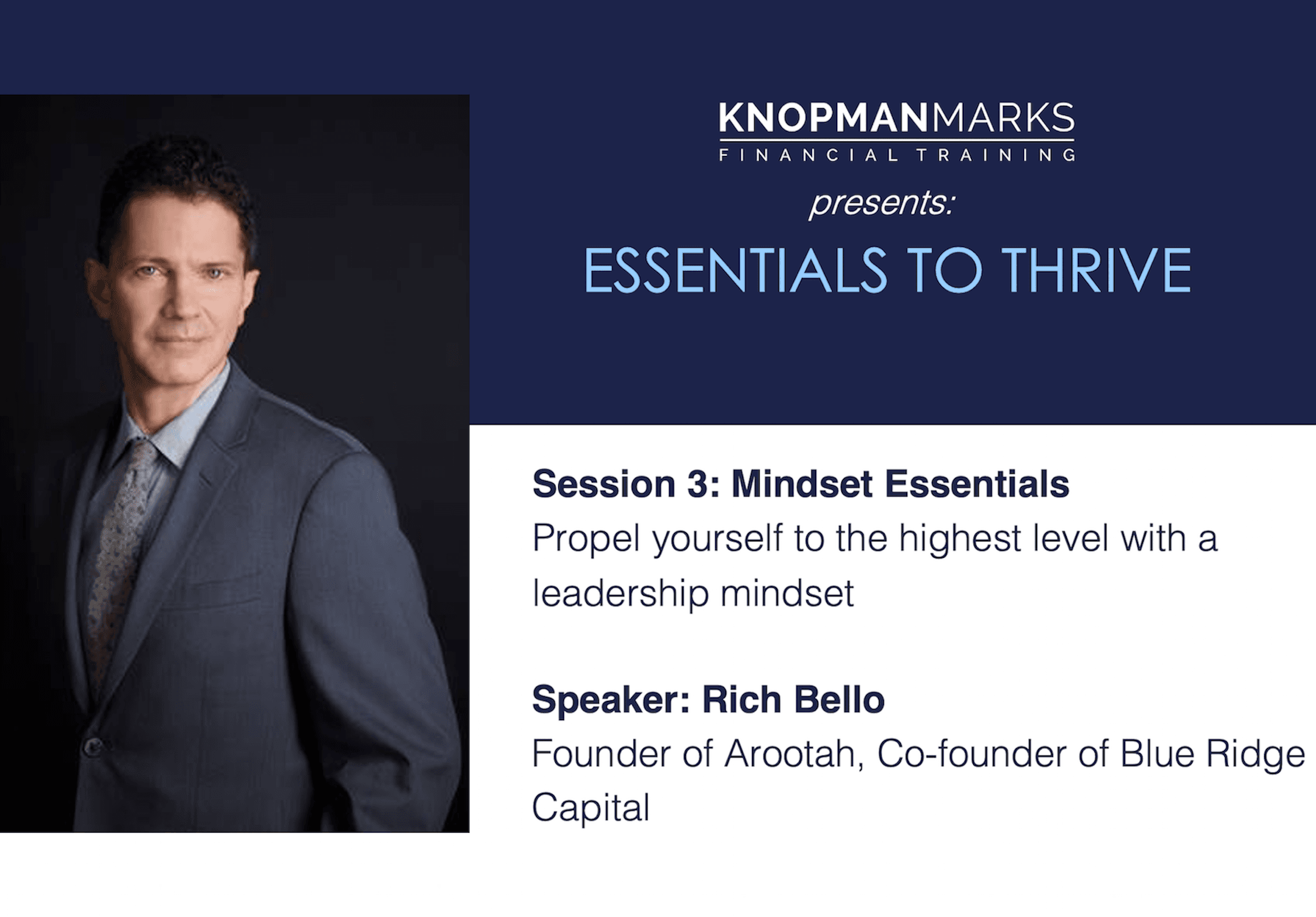How to Thrive in a Crisis? Develop a Leadership Mindset
Filed in: Essentials to Thrive, Knopman News

Rich Bello believes the mindset leaders choose, especially in a crisis, makes all the difference. In his lively and informative masterclass, Rich Bello emphasized our ability to attribute a positive or a negative meaning to whatever is happening around us. This choice guides our thoughts and actions – and determines our results. “Positive thoughts,” Bello says, “lead to positive outcomes.”
Bello certainly has a long track record as a leader who has positive outcomes. As co-founder and COO of Blue Ridge Capital, he has steered one of the premier businesses in the hedge fund industry for 23 years. He also leads Arootah, a digital wellness center, where Bello is able to focus on his passion for understanding what drives individuals and teams to maximize their performance.
His Essentials to Thrive masterclass, Mindset Essentials – Propel yourself to the highest level with a leadership mindset, covered everything from leadership psychology to how great leaders find the opportunity in any crisis. Bello provided concrete strategies that everyone can apply to discipline the unconscious mind to cultivate positive habits, let go of negative thoughts, and accentuate the positive. “After all, the key to unlocking opportunities,” he says, “is our mindset.”
3 Big Ideas to Foster a Leadership Mindset and Lead Through a Crisis
- Develop “crisitunity.” Leaders who have a crisitunity mindset search for opportunities in a crisis. “It’s more than a silver lining or making lemonade from lemons,” Bello says. “There are opportunities in every situation. At a minimum, a crisis is an opportunity to learn.” Our work, he explains, is to train our mind to look for the opportunity by making this a habit. Opportunities for business come from four places, he explains: new and existing products, services, customers, and clients. “Explore them all,” he advises.
- Pause to find the positive. The pause we take before responding in a crisis is critical. Great leaders avoid reacting reflexively. Instead, they stop and decide on a positive meaning. This may take time. “They keep asking, ‘what else can this mean?’” he says. The power of deciding on a positive meaning is that this action will lead to the most positive outcome.
- Our mindset can hold us back more than anything else. Bello told the story of Roger Bannister, the first person to run a four-minute mile. Bannister had been told, along with the rest of the world, that it was impossible to run a four-minute mile. Doctors said it could not happen. Bannister did not accept this limiting belief. He trained and eventually ran a four-minute mile. Soon, others started to run four-minute miles. “The hurdle wasn’t physiology,” Bello says, “it was mindset.” To develop a positive leadership mindset, refrain from dwelling on negative thoughts; reframe negative thoughts as positive; and focus on solutions, not problems.
Q&A with Rich Bello
Can you share a personal story of grit, a time you faced a difficult situation and fought your way through it?
When I was seven years old, my parents divorced, and I went through a very difficult culture shock. I moved with my father from Queens, New York, where I had friends on the next block, to a farm in upstate New York, where the nearest house was a mile away. We didn’t have a TV or a telephone. There were mountain lions, bears, and rattlesnakes. We were on welfare, collecting food stamps. It took grit to get to where I am today. Part of my drive was that I hated seeing my family in poverty. I wanted to make money to get them out of suffering.
Who inspired you along the way?
When I was a fifth grader, my grandfather told me to work hard in school so that I could one day go to the best business school in the world, the Wharton School at the University of Pennsylvania. He said: “You can fight your way out of poverty.” I would visit him at his dry-cleaning store and he would motivate me. He believed I could do it. I became obsessed with this goal. I did everything that was in my control. I got straight As. I became valedictorian of my class. I was captain of the basketball team. I didn’t give up until I was accepted at Wharton.
What is one daily habit that you believe has most contributed to your success?
Prioritization is the key to my success. I prioritize my goals, which I write down. You can’t keep your goals in your head. Once they’re written down, you have plans. Then you add action items to the plans. I prioritize the action items every day.
I’m pretty sure everyone would love to know your formula for success.
It all starts with a mission statement—for your life or business. What do you want your life to be? What do you want your epitaph to read? Then you do a gap analysis. Maybe you want to weigh 150 pounds and you weigh 250 pounds. Your gap is 100 pounds. You figure out all the gaps. Then you set goals to close those gaps. That’s where prioritizing your goals comes in. I schedule action items to reach my goals into every single day. This begins on Sunday nights, when I plan out my week based on my top priorities. That way, Monday morning, I’m ready to go. I know exactly what I’m doing.
What if the plan you came up with is not working out?
That’s why you want to measure your progress. Is the plan moving you closer to your goals? If you’re trying to lose weight, but it’s not working, take a step back. Maybe you were eating tons of fruit and didn’t realize there’s a lot of sugar there. Maybe you need to adjust your plan and eat more vegetables. The idea is, you keep going. You don’t give up. You have grit.
If you missed Rich’s leadership mindset session, a recording is available in the Training Center at www.knopman.com, where you can access his worksheets and action plans, and also access recordings for past sessions on keeping fueled and focused and on digital wellbeing.
Register here for the Essentials to Thrive series, and join us Wednesday at 12:30 pm ET for the fourth live-streaming masterclass: Neuroscience Essentials – Understand how your brain works to perform at your best with speaker Dr. Michael Mannino, Director of Programs at the Institute for Data Science and Computing at the University of Miami.
Written by Suzanne Riss
Suzanne Riss is an author and Director of Communications at Knopman Marks Financial Training. Previously the award-winning Editor-in-Chief of Working Mother magazine, she is a fierce advocate for issues facing working moms and an authority on work/life trends. Her expertise has been tapped in interviews by The New York Times, The Wall Street Journal, Good Morning America, the Today Show, and CNN. Suzanne's third book, Work Disrupted, published by Wiley, was released in January 2021.
Related posts
- Read more
Introducing How to Finance: A Beginner’s Guide to the Industry
One of our primary roles as educators is to bridge gaps in knowledge. Our newest course, How to F
- Read more
How Intentional Rest Boosts Performance
Though you may think that studying all afternoon without a break will improve your performance, r
- Read more
Research Analyst Exams Update – Changes to S86/87
In late February, FINRA filed with the SEC revisions to the content outline and selection specifi


